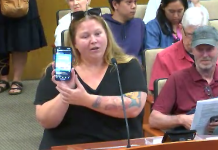By Macy Meinhardt & David N. Young
When it comes to the number of times council members should be able to bring issues up for discussion on behalf of residents, most cities hold policies that grant unlimited opportunities for elected officials to do so.
At times, it seems the debate around the agenda revolved around whether Cypress should be governed like a corporation with a CEO intent on accumulating power or how much power should representatives elected by the people have to determine what issues are presented to the Council.
The city of Cypress, like all cities, is a municipal corporation, per se, from a legal point of view, but in most cases, it is governed by the citizens who are legal residents of the resulting municipality.
According to Cypress Mayor Anne-Hertz Mallari, the current unrestricted ability of elected officials to bring up concerns during council meetings “has not served the city well” in regards to working relationships between council members and city staff employees.
As a result, Mayor Mallari initiated a proposal during the late April council meeting that would restrict the ability for city council members to speak on behalf of residents by adding items to the agenda only four times per calendar year while providing wider latitude and unfettered access to city manager Peter Grant to place items on the agenda.
While aimed to conserve city staff’s time and resources, opponents argue that the proposal is designed to wrestle away the control of Cypress citizens by limiting city council members’ ability to be proper conduits of the public.
“The answer to the question of how many items a council member should be able to add per year is as many as it takes to effectively represent their constituents,” said Councilmember David Burke.
If a council member wishes to bring an issue up to the city and has already surpassed their four-limit quota, the next step would be to either get approval from the city manager or receive a majority consensus from the four other council members.
The proposal also grants the city manager full discretion to place an item requested by the council member on the agenda.
“The city of Cypress is a municipal government which is funded by the residents of Cypress who council members represent. It’s not a corporation where the CEO makes the final decision,” said Councilmember Frances Marquez.
Although the policy is intended to create a more efficient and collaborative work environment, the proposal struck a chord amongst residents, who perceive it as a way the city is diminishing the democratic process by taking power away from elected officials.
“The ability for city council members to agendize what they need to in order to fairly and accurately represent their constituents is a critical need,” said Cypress resident and business owner Rachel Strong.
Other residents such as Katie Shapiro, also raised concerns in how much influence is given to the city manager in these matters.
“We’re actually only allowing an unelected appointed official to agendize items that have everything to do with the people that we elected to and their decision-making process.”
“To me that’s like the antithesis of freedom of speech,” said Shapiro.
Rachel Strong, a local business owner and former Council candidate said, “the city council represents a really important conduit of communications between the community and the decisions that get made.”
“Not just in Cypress but everywhere because, as people are saying, this is a fundamental part of the democratic process and anything of that sort of tapers off is, I think, problematic, troublesome, and in the worst case, dangerous,” she said.
In response to concerns surrounding Grant’s magnitude of involvement in Cypress matters, Hertz-Mallari contends that the city manager “does have a lot of need to bring things to the council.”
“That’s a very important working relationship,” Hertz-Mallari stated, suggesting that has been standard practice since the inception of the city. “But I do understand there are some stress points here.”
“I think that is a bunch of BS,” said resident Bob Youngsma. “I have a problem that you’re making the city manager have the responsibility to say [issues] will be there or not be there. He’s an employee. He works for you. He doesn’t tell you what you do or don’t do.”
Citizen Ed Kraemer reminded the Council that “citizens are at the top of the organizational chart. However, “constant backroom meetings and workshops held at times citizens can’t attend causes their vital input to be lost.”
He also suggested that all workshops and other meetings should be publicized, like Council meetings, which addressed another problematic provision in the Mayor’s new proposal.
Another contentious concern presented in Mallari’s proposal regarded the removal of any discussion related to financial impacts over $10,000 from council meetings and into workshops, which typically have less attendance and accessibility to the public than regular council meetings.
Ironically, Cypress workshop meetings, and their level of transparency, has been an ongoing debate on the council in recent weeks since they aren’t live-streamed or posted online. Access to these discussions is instead limited to only those who are able to make it in person, or who take the step to personally request the audio through the City Clerk’s office.
Although Council membe Marquez advocated for workshops to be made more accessible, the city asserts that adjusting the workshop rooms to be fitted with livestream technology poses a cyber security risk, since it takes place in the same room as confidential-closed session meetings.
Furthermore, Councilmember Marquez provided background on the way in which the agenda setting process has shifted over the course of the year. After bringing proposals to the city last Spring to adopt Asian heritage month and LGBTQ+ pride month, Marquez claims that her colleagues have gradually amended the policy to make it more difficult for council members to add items on the agenda.
“I am a voice for the residents and ran to ensure that resident voices who had long been ignored were brought into this chamber,” said Councilmember Marquez.
Yielding urgent concerns upon reading the proposal crafted by Grant and Mallari, Councilmember Burke took swift action in drafting an alternative policy for the council to consider instead.
Distributed to members of the audience and city leaders at the meeting, Burke’s proposal recognized that a “balance does need to be struck” when it comes to work items requested by council members to city staff.
“We need to be mindful of staff’s limited time and resources. And we want to avoid a situation where we devote excessive amounts of time and energy to ideas that have very little support in the community,” said Councilmember Burke.
Moreso, Burke’s proposal contended that city leaders should not have to receive a majority consensus when it comes to items getting on the agenda.
“If it takes three council members to ultimately pass an ordinance, it seems like two should be enough to have thoughtful consideration of the idea. If 40% of the democratically elected members of this council thinks something is important enough to put on the agenda, that deserves respect.” said Burke.
Due to prominent backlash, both from residents and from certain members of council, the team decided to take a further look at Burke’s alternative policy and bring it back up for discussion at next week’s council meeting.
“Even though I drafted this proposal, it’s more restrictive than I would personally like. But I think it represents a fair compromise based on some of the issues we’ve had over the agenda process,” said Burke.
Even so, the public will only get to see what officials work out behind the scenes, as Grant suggested, rather than let the public see the debate, or “how the sausage is made;” an ad-hoc committee of Burke and Hertz-Mallari will work with staff behind the scenes to develop a compromise agenda proposal to be presented at their next meeting.
The Council then voted unanimously to allow the ad-hoc subcommittee report back at the Council’s regular meeting.












